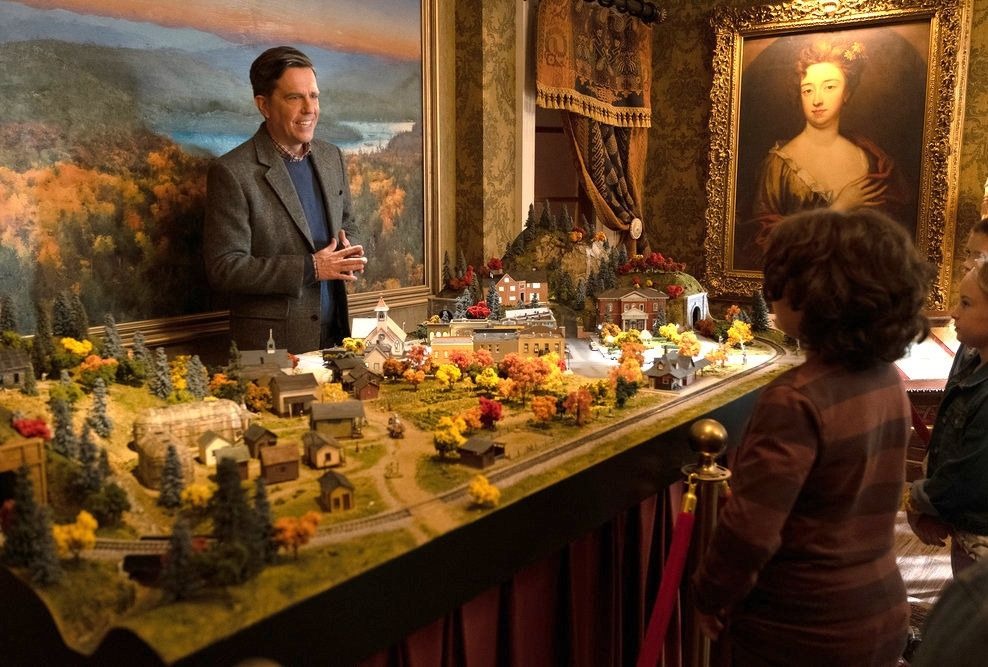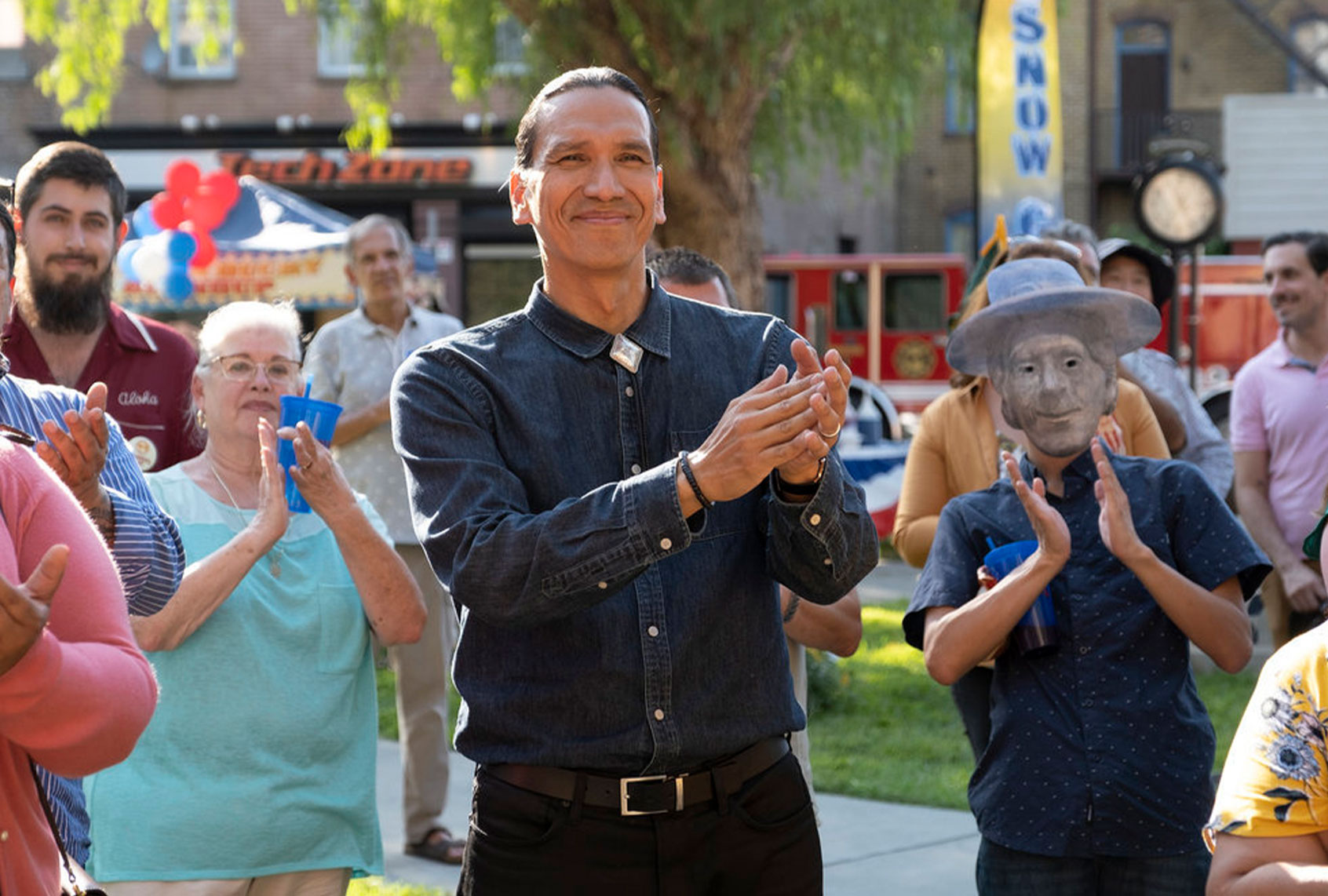“Rutherford Falls” co-creator Sierra Teller Ornelas never intended for her Peacock comedy to feel like a Native American culture class. She’s seen those types of TV shows and movies before. We all have.
“And it’s just a bummer, especially when it’s subject matter that you’re so excited to see.” Ornelas told Salon, adding, “I won’t name any actual titles. But I’ve looked at a movie title and gotten so excited to see a Native story this way, and you get there and it feels like homework.”
Ornelas’ sweet 10-episode comedy is nothing of the sort — it’s gently funny and populated with easy-to-root for characters you want to spend more time with, even when they behave badly. Fulfilling that part is Ed Helms‘ Nathan Rutherford, the last descendant of the town’s founder to live within its limits and the lifelong friend of Reagan Wells (Jana Schmieding).
They’re the sort of lovable platonic pair that executive producer Michael Schur specializes in, cut from the same cloth as “Parks and Recreation” best friends Leslie Knope and Ron Swanson. But though they have much in common, Nathan and Reagan don’t share a common view of their region’s history.
Reagan is Minishonka, part of a fictional tribal community with a reservation nearby Rutherford Falls, and in Nathan’s view of the town’s founding it was the white settlers who built the area.
Terry Thomas, a Minishonka community leader who runs the tribal casino (played by Michael Greyeyes), knows differently, and shares as much during an emergency board meeting of Running Thunder for a new mysterious venture: Running Lightning.
“A thousand years ago this place was a metropolis of longhouses. Indigenous people had complete autonomy along the Eastern seaboard. All of this was ours,” Thomas tells the Board adding, “I know you all know this.”
They do, but most Americans don’t. That’s why this moment in the series premiere and the scenes dealing with Rutherford Falls history are significant. That’s also why Ornelas’ participation along with that of the other Native writers working on “Rutherford Falls” makes the central story of how people reconcile with versions of history feel warm, easily understandable and funny.
The Minishonka are a fictional tribe, but that doesn’t change the truth in Terry’s point, particularly in the wake of a real-life politician’s racist and flat-out incorrect assertion that white people “birthed a nation from nothing” and that “there isn’t much Native American culture in American culture.”
Nathan Rutherford isn’t that awful, but in a comically stupid rant he does declare Rutherford Falls to be situated on land that belonged to his forebears. Terry’s speech speaks to this while also putting faces and voices to a historical record too many Americans would rather erase or dilute.

Ed Helms in “Rutherford Falls” (Peacock)
In the Rutherford Falls Heritage Museum, which Nathan manages, the Minishonka are bit players in a “historically accurate” diorama, while a statue of Nathan’s ancestor Lawrence Rutherford sit in the center of town. Nathan enthusiastically helps Reagan in her quest to open a Minishonka cultural center on the reservation but in early episodes doesn’t voice a need to revisit his own interpretation of the town’s story.
Helm and Schur developed the concept for the show over several years before bringing in Ornelas, a Mexican-American and Navajo writer who worked with Schur on “Brooklyn Nine-Nine” as well as on “Superstore.” This project gave her an opportunity to incorporate Indigenous characters, lives and perspectives into the sitcom’s main plot, something still too rare in TV comedies and the entertainment industry in general.
“One of the big conversations we really had and where we kind of started from is, what is American history, and what are the narratives that mainstream America clings to?” Ornelas said. “And, what are the narratives that are erased from history in order to continue to cling to those?”
“Rutherford Falls” uses those points to build a narrative about two people sorting out their own identity and how their personal histories fit within those of their discrete but related communities. By doing that, Ornelas said, the show finds its humor and crucial lessons in the blind spots where people are unable to reconcile the truth with popular ideas about Americana.
“As opposed to trying to say like, ‘This is our message about blank,’ we really wanted to kind of talk about blind spots that we all have collectively, and how that impacts each other in different ways,” she explained.
Let’s take a moment to appreciate how rare it is for a comedy to feature fully realized Indigenous characters and showing them simply living their lives, which we see in every episode of “Rutherford Falls,” but also the existence of a room with varied perspective on Native American culture.
Out of all writing staffs on TV series only 1.1% is Native American, according to the 2020 Writers Guild of America West’s Inclusion Report.
As for starring roles in TV shows and movies, the number is even smaller — around 0.3% of all top film roles in 2018 and 0.5% in 2019, according to the findings in 2020 edition of University of California Los Angeles Hollywood Diversity Report.
Plenty of analysis has explored the ramifications of all or mostly white writers’ rooms on cop dramas or medical shows, but in many network shows there has at least been some representation of Black and brown people in main casts on a regular basis. Merely casting non-white actors isn’t enough to guarantee a series won’t trade in problematic storylines or portrayals. Doing that requires an inclusive writers’ room whose variety of viewpoints is considered and incorporated into the narrative.
Committing to this is how “Rutherford Falls” can be unambiguously entertaining while bringing up points about history or assumptions about the relationships between tribal culture and commerce, or confront stereotypes.
“What I love so much about the show is that we can have different perspectives on things that I think most non-Native people think Native people are a monolith about. We’re not a monolith about anything,” Ornelas explained. “So casinos and capitalism, even within the room. . . we had different opinions on a lot of these issues and invited the whole room to talk about it.”
When Terry makes that speech to the Board members, he asks them if they’ve taken a moment to think about what it would feel like to see a metropolis full of people who looked like them living, working and building.
When he points out, “Many of us live in a country and a state and a town named after three old dead white people,” that could be true of any number of American towns.
Writing those discussions into “Rutherford Falls” offers the audience a few things to talk about too — not as homework, but an invitation.
“In many marginalized groups right now, there is the sentiment of ‘no stories about us without us,'” Ornelas said. “I’ve sort of always banged the drum of this idea of diversity should never just stem from altruism; it’s good business. The more like diverse perspectives you can have in any situation, the better your story will be.”
All episodes of “Rutherford Falls” are streaming on Peacock.

